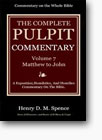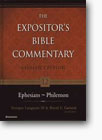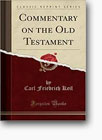The Immortality of the Soul: A Protest
by Joseph Agar Beet D.D.
August 25th, 1901
Chapter Two
The Teaching Of Christ
In ch. 1:we found abundant proof that Plato taught retribution beyond the grave, blessing for the righteous and terrible suffering for the wicked; and that he supported this teaching by endeavouring to prove that the soul of man is in its very nature indestructible, that it will never finally cease to think and feel. We found also decisive evidence that, long before the time of Plato, the ancient Egyptians lived in hope of endless life beyond the grave for the righteous and religious, and expected apparently extinction for the wicked. We found proof that during the three centuries before Christ the godly Jews looked forward to "eternal life," and warned the wicked of punishment awaiting them beyond death. A Jewish contemporary of Christ, a student of Plato, accepts in a few places the teaching of this last about the immortality of the soul: and Josephus, a later contemporary of Paul, says that the same teaching was held by the Pharisees and Essenes of his own day.
Retribution beyond the grave is implied clearly in the teaching of John the Baptist recorded in Mt. 3:10-12. For the reward and punishment there described can have no place in the present life. The same is implied in the teaching of Christ in the Sermon on the Mount: Mt. 7:19-27. Earlier in the same discourse (vv. 13, 14), we read of two paths, one leading to destruction and the other to life.
In a parable recorded in Mt. 13:24-30, explained in vv. 39-43, Christ declares that at the completion of the age, at His bidding, the wicked will be cast into "the furnace of fire," where "shall be weeping and gnashing of teeth," and that then "the righteous will shine as the sun in the kingdom of their Father." On this teaching, emphasis is laid by its repetition in vv. 48-50. Similar teaching, at an important turning-point in the life of Christ, is found in ch. 16:27: "The Son of Man will come in the glory of His Father with His angels: and then He will give back to each according to his action." A vision of judgment is given in ch. 25:31-46, where "all the nations" are gathered before Christ sitting on a throne of glory, and receive their award from His lips. He welcomes "the righteous into eternal life," and dismisses others, under a curse, "into eternal punishment." The above teaching is confirmed by other passages in the First Gospel, and by parallels in the Second and Third Gospels.
In John 3:16 we meet with the alternative, "may not perish but may have eternal life." In ch. 5:28, 29, Christ announces that at a definite "hour" He will summon all the dead to a resurrection of life or of judgment.
In Acts 17:31, Paul is reported to have said at Athens that God has fixed a day on which He will judge the world by a Man whom He has marked out for that honour by raising Him from the dead. Before Felix, as we read in ch. 24:25, Paul reasoned about "the coming judgment."
These scanty references in addresses of Paul are abundantly confirmed by his Epistles. In Rom. 2:6-12 we read that God "will give back to each according to his works," in close accord including glory, honour, with Mt. 16:27; peace, and eternal life for the righteous, and for the wicked anger and fury, affliction and helplessness, and destruction. So ch. 14:10: "We all shall stand at the judgment-seat of God." Exact retribution is conspicuously announced in 2 Cor. 5:10: "All of us must needs be made manifest before the judgment-seat of Christ, in order that each may obtain the things done through his body, whether good or bad." It is announced with equal definiteness and solemnity in Gal. 6:7, 8: "Be not deceived; God is not mocked. For whatever a man sow, this he will also reap. Because he that sows for his own flesh shall, from the flesh, reap corruption. But he that sows for the Spirit shall, from the Spirit, reap eternal life." In Ph. 3:19, we read of some "whose end is destruction." This can only mean destruction beyond the grave: for destruction of the body by death is the lot of all men, good and bad. In 2 Th. 1:8, 9, we read of Christ "giving just punishment to them that know not God and obey not the Gospel of our Lord Jesus, who shall pay penalty, even eternal destruction from the presence of the Lord, and from the glory of His strength." On the other hand, in 2 Tim. 4:7, 8, at the close of his life the Apostle writes, "I have fought the good fight, I have finished the course, I have kept the faith. Henceforth there is laid up for me the crown of righteousness which the Lord, the righteous Judge, will give me in that day; and not to me only, but to all them that have loved His appearing."
The above passages refer evidently to a retribution beyond the grave; and, with others similar, they leave no room for doubt that this was an important element in the teaching of Paul.
In I Peter 5- 4, we read of the unfading crown of glory awaiting faithful shepherds of the flock of Christ.
A more tremendous vision of judgment is found in Rev 20:11-15:"I saw a great white throne, and Him that sat upon it, from whose face fled the earth and the heaven, and place was not found for them. And I saw the dead, the great and the small, standing before the throne: and books were opened; and another book was opened, which is the Book of Life. And the dead were judged from the things written in the books, according to their works. And the sea gave up the dead in it: and death and Hades gave up the dead in them. And they were judged, each according to their works. And death and Hades were cast into the lake of fire. This is the second death, the lake of fire. And if any was not found written in the Book of Life, he was cast into the lake of fire."
The above quotations, which represent teaching running through the entire New Testament, are complete documentary evidence that retribution beyond death for all actions done on earth was an important and conspicuous element of the teaching of Christ and His Apostles.
The reward awaiting the righteous is in Mt. 19:16, 29 and its parallels, in ch. 25:46, Luke 10:25, seventeen times in the Fourth Gospel, eleven times in the addresses and letters of Paul, and six times in the First Epistle of John, described by the term eternal life. The word eternal, aionios, from aion, an age orlifetime, may be literally rendered age-lasting. In Prov. 22:28, 23:10, "Remove not eternal landmarks which thy fathers set," it describes a boundary which has stood for ages. Similarly Ps. 77:5, where eternal years are parallel to "ancient days." But much more frequently it refers to the future. The ordinances of the Levitical ritual are very frequently e.g. Ex. 12:14, 17, 24, Lev. 23:14, 21, 31, 41, - described as eternal statutes, nomimon aionion . Similarly, in Gen. 17:8, 48:4, Canaan is promised to the seed of Abraham "for an eternal possession." This use in the Septuagint, where the word is found some hundred and fifty times, must have influenced the meaning attached to it by the writers and early readers of the New Testament, who frequently quote the Septuagint. It forbids us to interpret the word eternal in the New Testament as in itself equivalent to endless. For no Christian will claim endless permanence for the Levitical ordinances. But this use of the word casts no shadow of doubt on the absolute endlessness of the life promised by Christ to His faithful servants. For this rests on grounds independent of the word before us. For, as we read in John 3:16, God gave His Son in order that they may not perish: and cessation of the life promised to them would be perdition. In Luke 1:33 we read that of the Kingdom of Christ "there will be no end:" and of that Kingdom they are citizens. The inheritance awaiting them is, in 1 Peter 1:4, said to be incorruptible and unfading. So is the crown of glory: ch. 5:4. But cessation of blessedness would be both decay and corruption. That the life promised by Christ to those who put faith in Him and obey Him is absolutely endless, is still further removed from all possibility of doubt by the immortal life of Christ Himself which His human brethren will share: see John 14:19, Rom. 8:17, 35-39, Rev. 3:21.
This "promise of life in Christ Jesus" and the hope of endless blessedness thereby evoked in us rest securely on the word of Christ confirmed by Him who gave His only-begotten Son in order that every one who believes in Him may not perish but may have eternal life, and raised Him from the dead, so that our faith and hope (1 Peter 1:21) may be in God. For no historic fact is more certain than that Jesus of Nazareth promised to all who put faith in Him a new life of devotion to God on earth, and endless blessedness beyond the grave.
In awful contrast to this blessed life stands, throughout the New Testament, the destruction of the wicked: olethros, apoleia, apollumi. These words are found in the New Testament in this technical theological sense more than thirty times. They are rendered in the R.V. destruction and destroy, perdition and perish, lose and lost; and convey in Greek the combined significance of these English equivalents. They denote neither suffering nor extinction, nor do they exclude these ideas, but simply ruin, the loss of all that gives worth to existence, whether the ruined object ceases to be or continues in a worthless mode of existence. These words, and their cognates and equivalents, are frequently used by Plato to denote the extinction of the soul. But, while thus using them, he puts his meaning beyond doubt by careful circumlocution: see p. 50. On the other hand, they are frequently used in Greek literature in cases in which there is no thought of extinction, but only of utter ruin. So Luke 15:6, 9, 32, where the lost was afterwards found; apololos kai eurethe.
In addition to this loss of endless blessedness, we find in the teaching of Christ recorded in the Synoptist Gospels and in the Book of Revelation pictures of actual and acute suffering e.g., Mt. 8:12, 13:42, 50, 22:13, 24:51, Luke 16:23-25.
It is worthy of note that by Christ and the Apostles this promise of blessing and this threatening of punishment are never directly or indirectly supported, as the hope of reward after death is conspicuously supported in the writings of Plato, by any doctrine of the essential and endless permanence of the human soul. Both phraseology and thought of Plato are altogether absent from the New Testament. The word immortality is found there only in 1 Cor. 15:53,54, in reference not to the soul but to the body, which though mortal must put on immortality and in 1 Tim. 6:16, as an attribute of God. An equivalent term, incorruptibility (aphtharsia), or absence of decay, is found in reference to the body in 1 Cor. 15:42, 50, 53, 54; and in other references in Rom. 2:7, Eph. 6:24, 2 Tim. 1:10. The cognate adjective is used as an attribute of God in Rom. 1:23, 1 Tim. 1:17; as a description of the reward of the righteous in 1 Cor. 9:25, 1 Pet. 1:4; of their risen bodies in 1 Cor. 15:52; and in other references in 1 Pet. 1:23, 3:4. The infinite value of the soul is recognised by Christ in. Mt. 16:26. But the New Testament never asserts or implies its essential and endless permanence; or, in other words, that, in virtue of its own nature or by the will of God, every human soul will think and feel for an endless succession of ages.
The above denial will find presumptive support in ch. 4., where I shall refer to the absence of any direct appeal to the Bible in various modern theological works which maintain the immortality of the soul.
It is worthy of note that whereas, as "we saw on p.3, Plato taught that the soul of man is a immortal (anolethrov) and imperishable, Christ asserts or implies the possibility of its destruction. So Mt. 10:28: "Fear Him that is able to destroy both body and soul": psychen apolesai. Similarly ch. 16:25: "Whoever desires to save his soul will lose it: apolesai auten. The word destruction, used frequently in the New Testament to describe the doom of the wicked, is quite alien to the thought and phrase of Plato. In this respect, modern popular Christian eschatology is much nearer to Plato than to Christ. On the other hand, Christ's promise of life eternal for the righteous and His threatening of destruction for the wicked were anticipated in a remarkable way, as we saw on pp. 12-15, in the teaching of the ancient Egyptians.
It has been suggested that the endless permanence of all human souls, even of the wicked, about whom alone there can be any question, may be inferred from the descriptions, in the Synoptist Gospels and the Book of Revelation, of the actual torment of the lost, implying continued existence, without any suggestion that their sufferings will ever cease. This inference would be legitimate if the endless suffering of the lost were taught clearly and without contradiction by the various writers of the New Testament. But, in this case, the immortality of the soul, as an inference from the endless suffering of the lost, could not be appealed to, as has frequently been done, in support of this latter doctrine. Otherwise, we should be arguing in a circle. But, as I shall show in ch. 5., the doctrine of the endless suffering of the lost is supported by at most some six or seven passages of Holy Scripture, and these by no means decisive; and against these must be set a still larger number of passages quite as definite which seem to assert or imply the ultimate extinction of sinners or of evil. This doctrine also lies open to most tremendous, and to many minds insuperable, moral objection. A doctrine itself resting on a foundation so unsafe cannot be made a safe foundation for another doctrine so important as the immortality of the soul.
On the other hand, since in the New Testament life beyond the grave is reserved for the righteous, and the wicked are said to be destroyed, it has been inferred that the punishment of the wicked will be ultimate extinction. This inference also is unsafe. For the life referred to is much more than existence. It is the normal and blessed state of a rational creature of God. And the loss of this life may be fitly described as destruction, even though the ruined ones continue to exist: for it is the loss of all that gives worth to existence.
We have now seen that the doctrine of the immortality of the soul, i.e. the essential and endless permanence of all human souls, so prominent in the teaching of Plato, has no place in the teaching of Christ and His Apostles. The difference is significant. In the absence of an historic revelation, Plato appealed, in proof of a retribution beyond the grave, a most important element in morality and religion, to the spiritual nature of the soul. But Christ claimed to be a Teacher sent from God to announce eternal life for all who put faith in Him. And, in support of His claim and of His gospel of life eternal, His followers appealed to His resurrection from the dead. To appeal now to the immortality of the soul in support of the Christian hope, is to illumine the light of the Gospel with the dim torch of Greek philosophy.











Comments